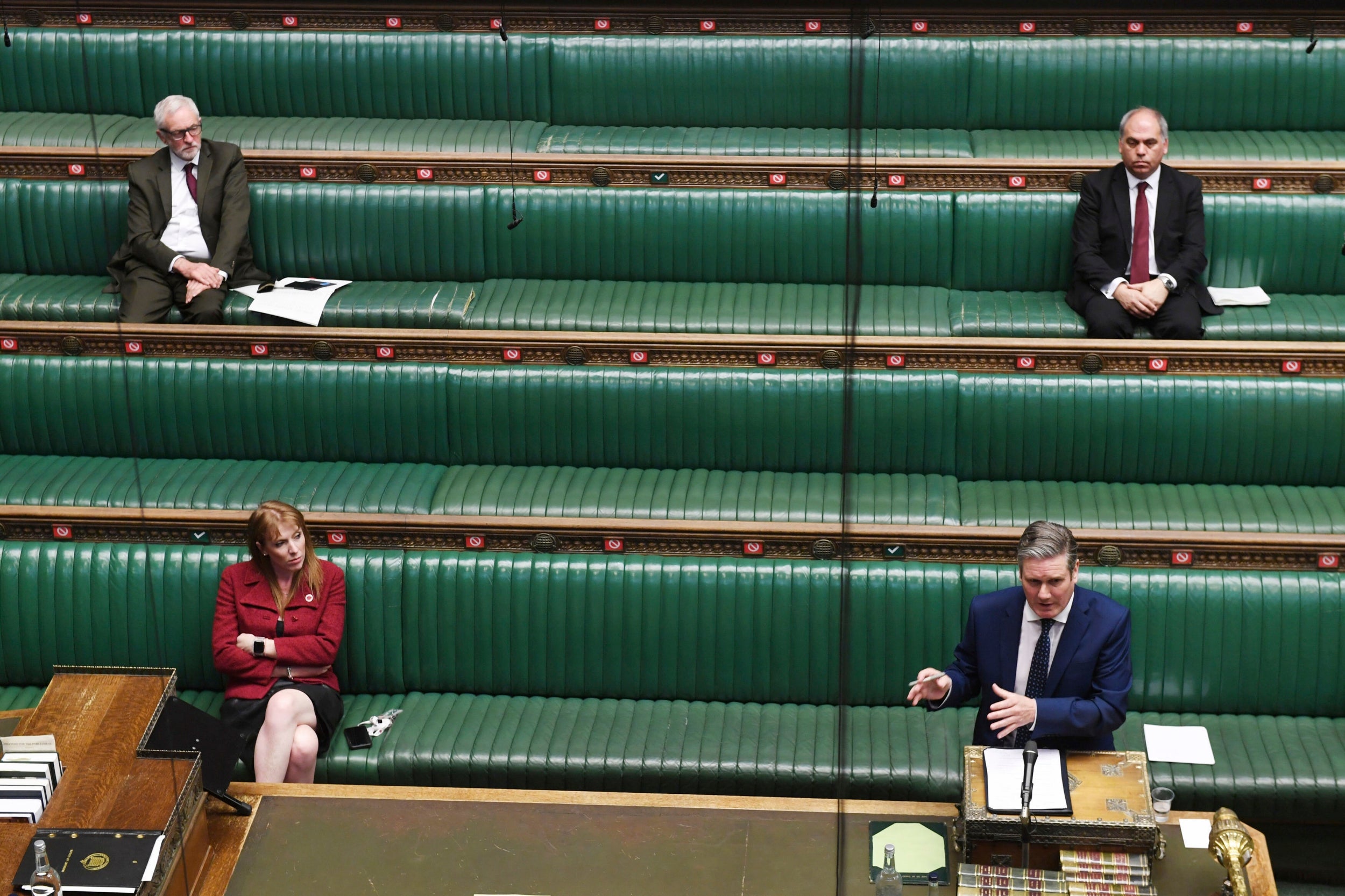Conservative MP Conor Burns has resigned as a government minister after the Commons standards watchdog recommended a seven-day suspension from parliament for abusing his privileged position in an attempt to intimidate a member of the public.
An investigation by the Commons Standards Commissioner found that the Bournemouth West MP used House of Commons notepaper to write to an individual who was in dispute with his father over the repayment of a loan, and warned that he could raise the matter in parliament.
Mr Burns is a close ally of Boris Johnson, serving as his parliamentary private secretary when he was foreign secretary, and was appointed minister of state for trade policy on the PM’s arrival at 10 Downing Street last July.
Download the new Independent Premium app
Sharing the full story, not just the headlines
A Number 10 spokesman said: “Conor Burns has resigned as minister of state for international trade following a report from the Parliamentary Commissioner for Standards. A replacement will be announced in due course.”
In a damning response to Ms Stone’s investigation, the Commons Committee on Standards said the MP had “used his parliamentary position in an attempt to intimidate a member of the public into doing as Mr Burns wished, in a dispute relating to purely private family interests which had no connection with Mr Burns’ parliamentary duties”.
The committee found that he “persisted in making veiled threats to use parliamentary privilege to further his family’s interests even during the course of the commissioner’s investigation, and … misleadingly implied that his conduct had the support of the House authorities”.
The committee – which includes lay members as well as MPs – took the highly unusual step of recommending a seven-day suspension, which is almost certain to be upheld by the Commons.
In a tweet, Mr Burns said: “With deep regret I have decided to resign as Minister of State for International Trade. Boris Johnson will continue to have my wholehearted support from the backbenches.”
Only scant details are given in today’s report of the financial dispute in which Mr Burns intervened.
The standards commissioner said she was approached by the complainant – who is not identified – over a letter on Commons headed notepaper received in February last year.
The latest news on Brexit, politics and beyond direct to your inbox
In it, Mr Burns stated that his father had made extensive attempts over a period of years to reach a settlement on a company’s repayment of a loan but was reluctant to take legal proceedings “because of age and family sensitivity”.
Urging the company to respond to his father’s demands, he added: “Failure to do so will ensure my involvement to secure the return of the money owed to my father.”
And he warned: “I am acutely aware that my role in the public eye could well attract interest especially if I were to use parliamentary privilege to raise the case (on which I have taken advice from the House authorities).”
In what the commissioner said was an apparent reference to the complainants former role as a senior public servant, he added: “I am also conscious that your high profile role outside [the company] could well add to that attention.”
In a submission to the commissioner’s inquiry, Mr Burns said he believed he was adhering with parliamentary rules in using the notepaper.
“My letter was one written by a son which is very concerned at the stress and distress that the complainant’s repeated refusal to engage of the subject has caused to a man in his late 70s. If the charge is being a caring son, I would accept it,” he said.
The commissioner found that Mr Burns’ use of Commons notepaper in his correspondence with the complainant appeared “more deliberate than accidental”.
The report said: “The Commissioner concludes that Mr Burns should have realised that the words used in his letter would be received as a threat, and on the balance of probabilities she thinks that that was Mr Burns’ intention.
“Also on the balance of probabilities, she considers that Mr Burns’ use of the crowned portcullis ‘was intended to add weight to the threat that he would speak about [the complainant] in a forum where [the complainant] would not have a right of reply’.”
The commissioner also revealed that during the course of the inquiry, Mr Burns suggested that it would be “ironic” if the complaint led to the revelation of details of the dispute which the complainant had previously attempted to keep concealed. Ms Stone said this suggestion was not “respectful of the standards system of the House”.
Stating that it would be possible for the MP to give an apology without revealing details of the dispute, she added: “Mr Burns’ conduct in this matter does not reflect well on him personally.
“However, I think his conduct has a wider impact. It gives fuel to the belief that Members are able and willing to use the privileges accorded them by their membership of the House to benefit their own personal interests. That Mr Burns has not acted on his threat to use parliamentary privilege will do little to dispel that belief.”
Ms Stone’s report was completed last October but publication was delayed by the general election.


1/50 3 May 2020
Staff at The Berkeley hotel give food to ambulance workers
Reuters

2/50 2 May 2020
One of a small group of anti-lockdown protesters speaks to a police officer as they gather outside New Scotland Yard in Victoria, London
AFP via Getty

3/50 1 May 2020
Bonnie the Llama grazes in a field in the Scottish Borders alongside a sign supporting the NHS as the UK continues in lockdown
PA

4/50 30 April 2020
Colonel Tom Moore and his daughter Hannah celebrate his 100th birthday, with an RAF flypast provided by a Spitfire and a Hurricane over his home in Marston Moretaine. Colonel Moore, formerly a Captain, received a promotion in honour of his birthday and in recognition of the funds, in excess of £30m, he raised for the NHS by walking laps of his garden
Capture the Light Photography/Getty

5/50 29 April 2020
Britain’s Labour leader Keir Starmer speaks during Prime Minister’s Questions, as members of Parliament observe social distancing due to the coronavirus, in the House of Commons, London, Wednesday, April 29, 2020
UK Parliament/AP

6/50 28 April 2020
NHS staff at the Mater hospital in Belfast, during a minute’s silence to pay tribute to the NHS staff and key workers who have died during the coronavirus outbreak
PA

7/50 27 April 2020
The sun rises behind redundant oil platforms moored in the Firth of Forth near Kirkcaldy, Fife. Global oil prices have crashed after the coronavirus pandemic reduced demand, with analysts warning that the oil majors may be looking at one of their biggest quarter-on-quarter profitability hits in history.
PA

8/50 26 April 2020
Frankie Lynch celebrates on the Mall where the finish of the London Marathon was due to take place today after running 2.6 miles instead of 26 miles to raise money for The Running Charity
Reuters

9/50 25 April 2020
A muslim woman walks past balloons outside the National Hospital for Neurology and Neurosurgery in London
Reuters

10/50 24 April 2020
An empty Brighton Pier, closed during the Coronavirus pandemic as temperatures reach 20 degrees in the South East
Rex

11/50 23 April 2020
Farmers work with vehicles to prepare a field next to a field of flowering rapeseed near Pontefract, West Yorkshire
AFP/Getty

12/50 22 April 2020
The Northern Lights, the Milky Way and a Lyrid meteor at the Bathing House near Howick, Northumberland, as the Lyrid meteor shower reached its peak
PA

13/50 21 April 2020
Badger the Border Collie surrounded by bluebells at Shrawley Wood in Worcestershire
PA

14/50 20 April 2020
A dog walker on Blyth beach in Northumberland
PA

15/50 19 April 2020
A piece of coronavirus themed street art grafitti in East London
AFP via Getty

16/50 18 April 2020
Members of the City Specialist Cleaning team spray disinfectant around posts in the town centre of Eastleigh, Hampshire
PA

17/50 17 April 2020
A taped-up bench in the hamlet of Diglea, Greater Manchester
AFP/Getty

18/50 16 April 2020
A woman wearing a protective face mask and gloves walks past graffiti in Bow, London
Reuters

19/50 15 April 2020
A burned down mobile phone mast in London. According to reports, at least 20 mobile phone masts across Britain are believed to have been vandalised and government and telecom sources are increasingly concerned about the impact of conspiracy theories linking coronavirus to 5G networks
EPA

20/50 14 April 2020
The new Nightingale Hospital in Washington, Tyne and Wear, being fitted out
PA

21/50 13 April 2020
Walkers enjoy the bluebells in Wanstead Park in London
PA

22/50 12 April 2020
A woman prays at the closed doors of Westminster Cathedral ahead of the Easter morning mass in London
PA

23/50 11 April 2020
A man jogs on an empty beach in Scarborough as the UK continues in lockdown to help curb the spread of the coronavirus
PA

24/50 10 April 2020
Military personnel testing people at a coronavirus test centre in the car park of Chessington World of Adventures
Reuters

25/50 9 April 2020
Posters drawn by children displayed in support of the NHS in a building near St Thomas’ Hospital in London
Getty

26/50 8 April 2020
A street cleaner in front of Coronavirus messaging on Picadilly Circus in London
Getty

27/50 7 April 2020
A jogger on the Millennium Bridge in London, as the UK continues in lockdown to help curb the spread of the coronavirus
PA

28/50 6 April 2020
A Royal Signals soldier practices during training held by the British Army. They are preparing them to support the Welsh Ambulance Service NHS Trust in the battle against coronavirus
Ministry of Defence/Reuters

29/50 5 April 2020
A police officer advises a woman to go home after spotting her enjoying the sun in Primrose Hill, London
AP

30/50 4 March 2020
New Leader of the Labour Party Keir Starmer speaks on the announcement of his victory in the leadership race of the Labour Party
AFP via Getty

31/50 3 April 2020
Health Secretary Matt Hancock and NHS staff stand on marks on the ground, put in place to ensure social distancing guidelines are adhered to, at the opening of the NHS Nightingale Hospital at the ExCel centre in London, a temporary hospital with 4000 beds which has been set up for the treatment of Covid-19 patients. PA Photo. Picture date: Friday April 3, 2020. Split into more than 80 wards containing 42 beds each, the facility will be used to treat Covid-19 patients who have been transferred from other intensive care units across London.
PA

32/50 2 April 2020
A child at Westlands Primary School paints a poster in support of the NHS in Newcastle-under-Lyme
Reuters

33/50 1 April 2020
Staff wearing PPE of gloves and face masks, as a preactionary measure against Covid-19, disinfect an ambulance after it arrived with a patient at St Thomas’ Hospital in north London
AFP via Getty

34/50 31 March 2020
Llandudno Pier remains closed and deserted of tourists during the pandemic lockdown in Wales
Getty

35/50 30 March 2020
Waves break against the pier at Tynemouth, on the North East coast
PA

36/50 29 March 2020
Waves crash over a car on the seafront during windy conditions in Broadstairs, Kent
PA

37/50 28 March 2020
Derbyshire Police dye the “blue lagoon” in Harpur Hill, Buxton black, as gatherings there are “dangerous” and are “in contravention of the current instruction of the UK Government”
PA

38/50 27 March 2020
A road sign advising drivers to ‘stay home protect NHS saves lives’ is visible on the M80 near Banknock as the UK continues in lockdown to help curb the spread of the coronavirus
PA

39/50 26 March 2020
A postman wears a mask and gloves to deliver letters in Broadstairs, Kent, after Prime Minister Boris Johnson has put the UK in lockdown to help curb the spread of the coronavirus. PA Photo. Picture date: Thursday March 26, 2020. The UK’s coronavirus death toll reached 463 on Wednesday.
PA

40/50 25 March 2020
Members of the public out exercising on Brighton beach at sunset
Getty

41/50 24 March 2020
Military vehicles cross Westminster Bridge after members of the 101 Logistic Brigade delivered a consignment of medical masks to St Thomas’ hospital
Getty

42/50 23 March 2020
Commuters travel on the London underground during the Coronavirus pandemic
Getty

43/50 22 March 2020
People walk on the seafront after recent incidents of members of the public ignoring government advice on social distancing on in Hove
Getty

44/50 21 March 2020
A general view of an empty Trafalgar Square in London. There have as of now been 3,983 diagnosed coronavirus cases in the UK and 177 deaths
Getty

45/50 20 March 2020
Swans swim on the banks of the River Severn in Worcester
PA

46/50 19 March 2020
A piece of art by the artist, known as the Rebel Bear has appeared on a wall on Bank Street in Glasgow. The new addition to Glasgow’s street art is capturing the global Coronavirus crisis. The piece features a woman and a man pulling back to give each other a kiss
PA

47/50 18 March 2020
Students tend to Spring Lambs at Moreton Morrell College in Warwickshire
PA

48/50 17 March 2020
Caerphilly Castle in South Wales joins Tourism Ireland’s Global Greenings campaign to mark St Patrick’s Day
PA

49/50 16 March 2020
Shoppers form long queues ahead of the opening of a Costco wholesale store in Chingford
Getty

50/50 15 March 2020
Players sing songs in the changing room after their game of football at Hackney Marshes in London
Reuters

1/50 3 May 2020
Staff at The Berkeley hotel give food to ambulance workers
Reuters

2/50 2 May 2020
One of a small group of anti-lockdown protesters speaks to a police officer as they gather outside New Scotland Yard in Victoria, London
AFP via Getty

3/50 1 May 2020
Bonnie the Llama grazes in a field in the Scottish Borders alongside a sign supporting the NHS as the UK continues in lockdown
PA

4/50 30 April 2020
Colonel Tom Moore and his daughter Hannah celebrate his 100th birthday, with an RAF flypast provided by a Spitfire and a Hurricane over his home in Marston Moretaine. Colonel Moore, formerly a Captain, received a promotion in honour of his birthday and in recognition of the funds, in excess of £30m, he raised for the NHS by walking laps of his garden
Capture the Light Photography/Getty

5/50 29 April 2020
Britain’s Labour leader Keir Starmer speaks during Prime Minister’s Questions, as members of Parliament observe social distancing due to the coronavirus, in the House of Commons, London, Wednesday, April 29, 2020
UK Parliament/AP

6/50 28 April 2020
NHS staff at the Mater hospital in Belfast, during a minute’s silence to pay tribute to the NHS staff and key workers who have died during the coronavirus outbreak
PA

7/50 27 April 2020
The sun rises behind redundant oil platforms moored in the Firth of Forth near Kirkcaldy, Fife. Global oil prices have crashed after the coronavirus pandemic reduced demand, with analysts warning that the oil majors may be looking at one of their biggest quarter-on-quarter profitability hits in history.
PA

8/50 26 April 2020
Frankie Lynch celebrates on the Mall where the finish of the London Marathon was due to take place today after running 2.6 miles instead of 26 miles to raise money for The Running Charity
Reuters

9/50 25 April 2020
A muslim woman walks past balloons outside the National Hospital for Neurology and Neurosurgery in London
Reuters

10/50 24 April 2020
An empty Brighton Pier, closed during the Coronavirus pandemic as temperatures reach 20 degrees in the South East
Rex

11/50 23 April 2020
Farmers work with vehicles to prepare a field next to a field of flowering rapeseed near Pontefract, West Yorkshire
AFP/Getty

12/50 22 April 2020
The Northern Lights, the Milky Way and a Lyrid meteor at the Bathing House near Howick, Northumberland, as the Lyrid meteor shower reached its peak
PA

13/50 21 April 2020
Badger the Border Collie surrounded by bluebells at Shrawley Wood in Worcestershire
PA

14/50 20 April 2020
A dog walker on Blyth beach in Northumberland
PA

15/50 19 April 2020
A piece of coronavirus themed street art grafitti in East London
AFP via Getty

16/50 18 April 2020
Members of the City Specialist Cleaning team spray disinfectant around posts in the town centre of Eastleigh, Hampshire
PA

17/50 17 April 2020
A taped-up bench in the hamlet of Diglea, Greater Manchester
AFP/Getty

18/50 16 April 2020
A woman wearing a protective face mask and gloves walks past graffiti in Bow, London
Reuters

19/50 15 April 2020
A burned down mobile phone mast in London. According to reports, at least 20 mobile phone masts across Britain are believed to have been vandalised and government and telecom sources are increasingly concerned about the impact of conspiracy theories linking coronavirus to 5G networks
EPA

20/50 14 April 2020
The new Nightingale Hospital in Washington, Tyne and Wear, being fitted out
PA

21/50 13 April 2020
Walkers enjoy the bluebells in Wanstead Park in London
PA

22/50 12 April 2020
A woman prays at the closed doors of Westminster Cathedral ahead of the Easter morning mass in London
PA

23/50 11 April 2020
A man jogs on an empty beach in Scarborough as the UK continues in lockdown to help curb the spread of the coronavirus
PA

24/50 10 April 2020
Military personnel testing people at a coronavirus test centre in the car park of Chessington World of Adventures
Reuters

25/50 9 April 2020
Posters drawn by children displayed in support of the NHS in a building near St Thomas’ Hospital in London
Getty

26/50 8 April 2020
A street cleaner in front of Coronavirus messaging on Picadilly Circus in London
Getty

27/50 7 April 2020
A jogger on the Millennium Bridge in London, as the UK continues in lockdown to help curb the spread of the coronavirus
PA

28/50 6 April 2020
A Royal Signals soldier practices during training held by the British Army. They are preparing them to support the Welsh Ambulance Service NHS Trust in the battle against coronavirus
Ministry of Defence/Reuters

29/50 5 April 2020
A police officer advises a woman to go home after spotting her enjoying the sun in Primrose Hill, London
AP

30/50 4 March 2020
New Leader of the Labour Party Keir Starmer speaks on the announcement of his victory in the leadership race of the Labour Party
AFP via Getty

31/50 3 April 2020
Health Secretary Matt Hancock and NHS staff stand on marks on the ground, put in place to ensure social distancing guidelines are adhered to, at the opening of the NHS Nightingale Hospital at the ExCel centre in London, a temporary hospital with 4000 beds which has been set up for the treatment of Covid-19 patients. PA Photo. Picture date: Friday April 3, 2020. Split into more than 80 wards containing 42 beds each, the facility will be used to treat Covid-19 patients who have been transferred from other intensive care units across London.
PA

32/50 2 April 2020
A child at Westlands Primary School paints a poster in support of the NHS in Newcastle-under-Lyme
Reuters

33/50 1 April 2020
Staff wearing PPE of gloves and face masks, as a preactionary measure against Covid-19, disinfect an ambulance after it arrived with a patient at St Thomas’ Hospital in north London
AFP via Getty

34/50 31 March 2020
Llandudno Pier remains closed and deserted of tourists during the pandemic lockdown in Wales
Getty

35/50 30 March 2020
Waves break against the pier at Tynemouth, on the North East coast
PA

36/50 29 March 2020
Waves crash over a car on the seafront during windy conditions in Broadstairs, Kent
PA

37/50 28 March 2020
Derbyshire Police dye the “blue lagoon” in Harpur Hill, Buxton black, as gatherings there are “dangerous” and are “in contravention of the current instruction of the UK Government”
PA

38/50 27 March 2020
A road sign advising drivers to ‘stay home protect NHS saves lives’ is visible on the M80 near Banknock as the UK continues in lockdown to help curb the spread of the coronavirus
PA

39/50 26 March 2020
A postman wears a mask and gloves to deliver letters in Broadstairs, Kent, after Prime Minister Boris Johnson has put the UK in lockdown to help curb the spread of the coronavirus. PA Photo. Picture date: Thursday March 26, 2020. The UK’s coronavirus death toll reached 463 on Wednesday.
PA

40/50 25 March 2020
Members of the public out exercising on Brighton beach at sunset
Getty

41/50 24 March 2020
Military vehicles cross Westminster Bridge after members of the 101 Logistic Brigade delivered a consignment of medical masks to St Thomas’ hospital
Getty

42/50 23 March 2020
Commuters travel on the London underground during the Coronavirus pandemic
Getty

43/50 22 March 2020
People walk on the seafront after recent incidents of members of the public ignoring government advice on social distancing on in Hove
Getty

44/50 21 March 2020
A general view of an empty Trafalgar Square in London. There have as of now been 3,983 diagnosed coronavirus cases in the UK and 177 deaths
Getty

45/50 20 March 2020
Swans swim on the banks of the River Severn in Worcester
PA

46/50 19 March 2020
A piece of art by the artist, known as the Rebel Bear has appeared on a wall on Bank Street in Glasgow. The new addition to Glasgow’s street art is capturing the global Coronavirus crisis. The piece features a woman and a man pulling back to give each other a kiss
PA

47/50 18 March 2020
Students tend to Spring Lambs at Moreton Morrell College in Warwickshire
PA

48/50 17 March 2020
Caerphilly Castle in South Wales joins Tourism Ireland’s Global Greenings campaign to mark St Patrick’s Day
PA

49/50 16 March 2020
Shoppers form long queues ahead of the opening of a Costco wholesale store in Chingford
Getty

50/50 15 March 2020
Players sing songs in the changing room after their game of football at Hackney Marshes in London
Reuters
Mr Burns apologised to committee in a letter in March, in which he said: “As I have openly acknowledged, on reflection, I absolutely should not have written to the complainant in the terms I did or used House stationery to do so. I am sorry I did so and regret it.”
He added: “My motivation was to try and get the company to engage with my father on a long running dispute. To this day they have not done so and my father is taking court action. This has had a significant negative impact on his health.
“At the time I wrote I was under a huge amount of personal stress as I explained to the Commissioner privately.
“It has been very distressing to me that I have added to my elderly father’s worries. To be asked every week by him if there is news on the inquiry has been very hard to take.
“I profoundly regret involving myself in this in any way and if I could turn the clock back I would not have done it.“

– A second Tory minister, Greg Hands, was told to apologise after admitting using free Commons stationery and postage worth a total of around £4,500 to send a newsletter to constituents in his Hammersmith and Fulham seat.
The standards committee noted that the international trade minister initially agreed to issue an apology, acknowledge he had breached Westminster rules and pay for the mailshot. However, a few days later he withdrew his offer.
The committee noted that his move came shortly after the prime minister called a general election and said that “he may well have been motivated by the desire to avoid the embarrassment of having to make a public apology for breaking parliamentary rules during an election campaign”.
In a report upholding Ms Stone’s finding that Mr Hands had breached the rules, the committee said he should make a personal statement of apology to the Commons, not only for his breach but also for his “inappropriate conduct” in forcing a delay to the conclusion of his case.


